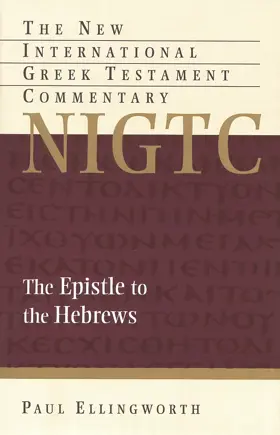

The Epistle to the Hebrews
in New International Greek Testament Commentary
The study of the Epistle to the Hebrews has traditionally been hampered by a number of factors. For example, for most of Christian history, the attribution of Hebrews to Paul has made it more difficult for readers to hear this epistle's distinctive voice. Among Gentile Christians, it has also been wrongly assumed that Hebrews is of interest only to Jews. And it has sometimes been thought that Hebrews represents a compromise or halfway stage between Judaism and Christianity, in contrast with the pure message of the Gospels and the radical Christianity of Paul. These and other factors have tended to combine to give Hebrews an undeserved reputation for obscurity.
This excellent commentary by Paul Ellingworth adeptly removes such barriers to the meaning of Hebrews, revealing the value of this complex but immensely important New Testament epistle for all readers, past and present. Ellingworth begins with a detailed study of the Greek text before working outward to consider the wider context, linguistic questions, and the relation of Hebrews to other early Christian writings and to the Old Testament. Nonbiblical writings such as Philo and the Dead Sea Scrolls, though less directly related to Hebrews, are considered where appropriate.
Unveiling the discourse structure of this carefully written letter, Ellingworth's commentary helps make coherent sense of the complexities of Hebrews. As a result of his exhaustive study, Ellingworth finds Hebrews to be primarily a pastoral, not a polemical, writing. Showing how Hebrews beautifully emphasizes the supremacy of Christ, Ellingworth concludes that the essential purpose of the epistle—which maintains the continuity of God's people before and after Christ—is to encourage readers to base their lives on nothing other and nothing less than Jesus.
Collections
This book appears in the following featured collections.
- John Piper's NT Commentary Recommendations by John Piper (Desiring God)
- D. A. Carson's Commentary "Best Buys" by D. A. Carson
- New Testament Advanced Commentaries by Moore Theological College Journal: Societas
- Basic Library Booklist by Detroit Baptist Theological Seminary
- Cambridge Chinese Christian: Recommended Commentaries by Calvin Cheah
- Building an NT Commentary Library by Invitation to Biblical Interpretation (Kostenberger & Patterson)
- The Pastor’s Bookshelf by Scot McKnight
- New Testament Commentaries & Monographs by Princeton Theological Seminary
- Recommended New Testament Commentaries for Evangelical Pastors by Thomas R. Schreiner
- TGC: Scholarly Commentaries by The Gospel Coalition











